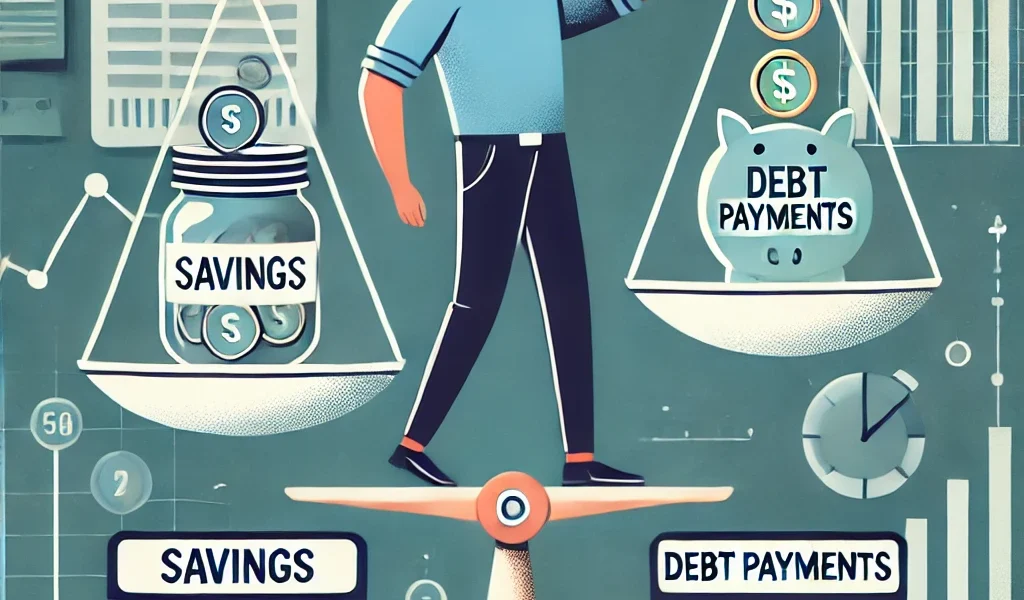Introduction
Balancing debt repayment with saving money can feel like a challenge, but it’s essential for long-term financial stability. Many people believe they must choose between paying off debt or saving, but with the right strategies, you can do both effectively. This guide will provide practical steps to help you manage debt while building your savings.
Understanding the Importance of Saving While Paying Off Debt
When facing debt, the primary instinct may be to clear it all as soon as possible. However, saving while repaying debt is crucial for financial security. Here’s why:
- Emergency Fund Protection: Having savings prevents you from relying on credit for unexpected expenses.
- Financial Growth: Even small savings can compound over time, creating financial security.
- Psychological Relief: A financial cushion reduces stress and improves financial confidence.
Step-by-Step Guide to Saving Money While Paying Off Debt
1. Assess Your Financial Situation
Before creating a savings and debt repayment plan, assess your financial health:
- List all debts (credit cards, loans, mortgages) along with their interest rates.
- Calculate your income and essential expenses.
- Identify areas where you can cut costs.
2. Set Clear Financial Goals
Having clear objectives helps in creating an actionable plan:
- Short-term goals: Building an emergency fund, reducing high-interest debt.
- Long-term goals: Retirement savings, homeownership, financial independence.
3. Create a Budget and Stick to It
A budget helps you allocate funds effectively. Follow these budgeting principles:
- 50/30/20 Rule: Allocate 50% of income for necessities, 30% for wants, and 20% for savings and debt repayment.
- Zero-Based Budgeting: Assign every dollar to a specific purpose.
- Use Budgeting Apps: Tools like Mint, YNAB, or Excel spreadsheets help track expenses.
4. Build an Emergency Fund First
Before aggressively paying off debt, establish an emergency fund of at least 3-6 months’ worth of expenses. This prevents you from falling back into debt during emergencies.
5. Prioritize High-Interest Debt (Debt Avalanche Method)
The debt avalanche method focuses on paying off high-interest debt first while making minimum payments on other loans. This approach:
- Saves money on interest.
- Reduces overall debt faster.
Alternatively, the Debt Snowball Method (paying off smaller debts first for motivation) can also be effective if you need quick wins to stay motivated.
6. Automate Savings and Debt Payments
Set up automatic transfers for both savings and debt payments. This ensures consistency and removes the temptation to spend excess money.
7. Cut Unnecessary Expenses
Identify areas where you can reduce spending to free up more money for savings and debt repayment:
- Cook at home instead of eating out.
- Cancel unused subscriptions.
- Use public transportation instead of driving.
- Shop smart by using discounts and cashback apps.
8. Increase Your Income
If your current income isn’t enough to save and pay off debt, consider these options:
- Take on a side hustle (freelancing, gig work, online businesses).
- Ask for a raise or switch to a higher-paying job.
- Sell unused items for extra cash.
9. Use Windfalls Wisely
Any unexpected money, like tax refunds, bonuses, or inheritance, should be allocated towards savings and debt repayment instead of unnecessary spending.
10. Consider Balance Transfers and Debt Consolidation
If you have multiple high-interest debts, consider:
- Balance Transfer Credit Cards: These offer 0% interest for a promotional period, allowing you to pay off debt faster.
- Debt Consolidation Loans: A single lower-interest loan to pay off multiple high-interest debts.
11. Take Advantage of Employer Benefits
Check if your employer offers benefits such as:
- Retirement Matching: If your employer matches your 401(k) contributions, contribute enough to maximize this free money.
- HSA/FSA Accounts: These help save on medical expenses.
12. Stay Disciplined and Monitor Progress
Track your savings and debt repayment progress regularly. Adjust your plan based on changing financial circumstances. Celebrate small milestones to stay motivated.
Conclusion
Paying off debt while saving money requires balance, discipline, and smart financial planning. By following these strategies, you can achieve both financial security and freedom. Remember, even small savings make a difference in the long run, and reducing debt step by step leads to long-term financial stability.
Start today, stay consistent, and watch your financial health improve!




